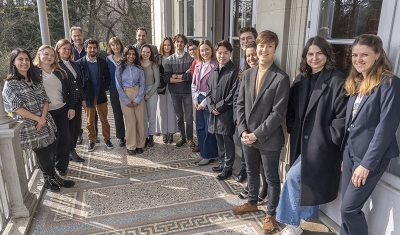LLM in International Humanitarian Law and Human Rights: What our Alumni Say


Geneva Call
12 January 2021
Ezequiel Heffes works as a Thematic Legal Adviser at Geneva Call, a humanitarian NGO that engages armed non-State actors to increase their level of compliance with humanitarian norms. He graduated from the Geneva Academy in 2013, and since then he has worked in the humanitarian sphere, first as an ICRC Delegate in Colombia, Afghanistan and the Democratic Republic of the Congo, and then at Geneva Call.
At Geneva Call, he is in charge of certain thematic files, notably health care, child protection issues and landmines. He has given advice to colleagues on these files, and delivered trainings to numerous stakeholders, including armed actors, on humanitarian norms. He has also participated in bilateral meetings to discuss their understanding and interpretation of these norms, as well as the challenges they may face when attempting to comply with the applicable legal framework.
What are the Strengths of the Programme?
In my view, the LLM has three strengths. First, it is based in Geneva, which allows students to be in touch with different specialized organizations and scholars working on various areas of international law. Second, it is taught by some of the most influential specialists in the field. In addition to their knowledge of the subject-matters, they bring a real-life experience that is difficult to find elsewhere. Third, once you come to the Geneva Academy, you are part of a bigger community of individuals spread around the world. Geneva Academy’s alumni can be found working at the UN and its various branches and bodies, ICRC, governments, NGOs and international criminal tribunals. Many of my former classmates are now colleagues with whom I have professional exchanges in different fora.
How was Teaching?
The combination of core courses and optional ones also represents an added value of the programme, as it allows students to have some flexibility on the topics they want to study. The teaching assistants (TAs) also deserve to be mentioned. By assisting in much-needed tutorials, they serve as an excellent complement to the professors and lecturers.
Your Best Memories of the Programme?
It is obviously difficult to select just a few. The study trip to Solferino is definitely the first one that comes to my mind. We were accompanied by the Directors of the Geneva Academy at the time, all the TAs and the students. The trip was one of the highlights of the year. I also remember with great appreciation the exchanges we had with my classmates when preparing for the tutorials and exams.
What Did it Bring to your Career?
It was one of the most important steps I have taken. Thanks to the Geneva Academy I was able to do a professionalizing experience at the ICRC, a humanitarian organization for which I worked after finalizing the LLM. In addition, studying at the Geneva Academy allowed me to develop a structure for legal reasoning, something I did not have before coming to Geneva. Not only I have gained in substance, I believe that the Geneva Academy also provides the tools that allow students to produce better legal argumentation.
Do you use what you learned in class in your work?
Yes, I do. The analytical structure one acquires at the Geneva Academy is probably unique, and it has served me throughout the years in various positions and for different discussions, such as on the notion of protected person in IHL, the extraterritorial application of international human rights law and the interplay between these two branches.
Would you Recommend It?
Yes, absolutely.









